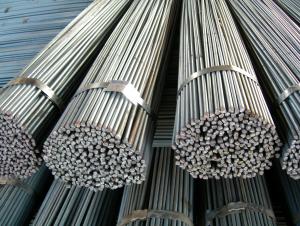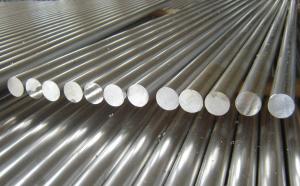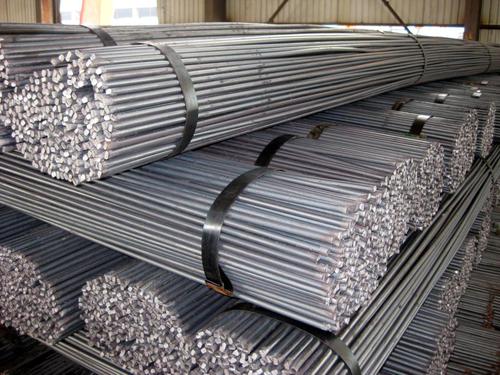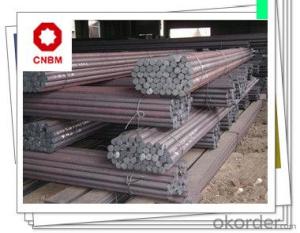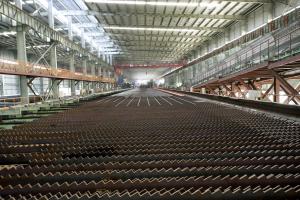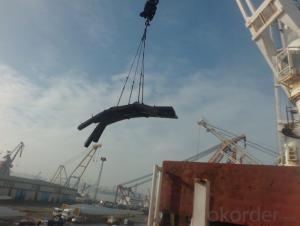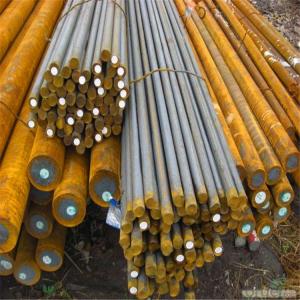Hot Rolled Steel Round Bar 40Cr
- Loading Port:
- China Main Port
- Payment Terms:
- TT or LC
- Min Order Qty:
- 100 m.t.
- Supply Capability:
- 2000 m.t./month
OKorder Service Pledge
OKorder Financial Service
You Might Also Like
Product Applications:
Hot Rolled Steel Round Bar are ideal for a large number of architectural and engineering structures. Or it can be used in construction of plants for the production of steel house frames, high-voltage transmission towers, bridges, vehicles, boilers, containers, ships, etc
Product Advantages:
OKorder's Hot Rolled Steel Round Bars are durable, strong, and with competitive price
Main Product Features:
· Premium quality
· Prompt delivery & seaworthy packing (30 days after receiving deposit)
· Corrosion resistance
· Can be recycled and reused
· Mill test certification
· Professional Service
· Competitive pricing
Product Specifications:
Manufacture: Hot rolled
Grade: Q195 – 235
Certificates: ISO, SGS, BV, CIQ
Length: 6m – 12m, as per customer request
Packaging: Export packing, nude packing, bundled
Diameter | Mass | Diameter | Mass | Diameter | Mass |
(mm) | (kg/m) | (mm) | (kg/m) | (mm) | (kg/m) |
6 | 0.22 | 22 | 2.98 | 53 | 17.30 |
7 | 0.30 | 24 | 3.55 | 56 | 19.30 |
8 | 0.40 | 25 | 3.85 | 60 | 22.20 |
9 | 0.50 | 26 | 4.17 | 63 | 24.50 |
10 | 0.62 | 28 | 4.83 | 65 | 26.00 |
11 | 0.75 | 30 | 5.55 | 70 | 30.20 |
12 | 0.89 | 32 | 6.31 | 75 | 34.70 |
13 | 1.04 | 34 | 7.13 | 80 | 39.50 |
14 | 1.21 | 36 | 7.99 | 85 | 44.50 |
15 | 1.39 | 38 | 8.90 | 90 | 49.90 |
16 | 1.58 | 40 | 9.86 | 95 | 55.60 |
17 | 1.78 | 42 | 10.90 | 100 | 61.70 |
18 | 2.00 | 45 | 12.50 | 120 | 88.85 |
19 | 2.23 | 48 | 14.20 | 140 | 120.93 |
20 | 2.47 | 50 | 15.40 | 150 | 138.82 |
FAQ:
Q1: Why buy Materials & Equipment from OKorder.com?
A1: All products offered byOKorder.com are carefully selected from China's most reliable manufacturing enterprises. Through its ISO certifications, OKorder.com adheres to the highest standards and a commitment to supply chain safety and customer satisfaction.
Q2: How do we guarantee the quality of our products?
A2: We have established an advanced quality management system which conducts strict quality tests at every step, from raw materials to the final product. At the same time, we provide extensive follow-up service assurances as required.
Q3: How soon can we receive the product after purchase?
A3: Within three days of placing an order, we will begin production. The specific shipping date is dependent upon international and government factors, but is typically 7 to 10 workdays.
Q4:What is the package
A4: Standard seaworthy packing or as customer required; all goods are packed in bundle with steel strips and shipped by break bulk vessel or container
Images:
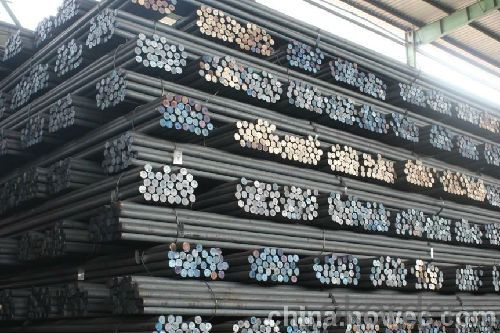
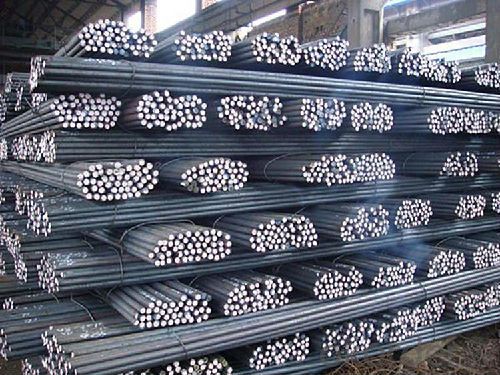
- Q: Can steel round bars be forged?
- Yes, steel round bars can be forged.
- Q: What is the difference between a rough turned and a hot rolled steel round bar?
- The manufacturing processes and resulting properties of a rough turned steel round bar and a hot rolled steel round bar differ. To produce a rough turned steel round bar, a steel billet or ingot is heated to a high temperature and then subjected to rough machining processes. This involves removing excess material from the surface to achieve the desired size and shape. The result is a slightly smoother surface compared to the hot rolled bar, although there may still be some minor imperfections. Rough turned bars are often used when a smoother surface finish is required, such as in machining operations. On the other hand, a hot rolled steel round bar is manufactured by heating a steel billet or ingot to extremely high temperatures and passing it through a series of rolling mills. This hot rolling process involves compressing the steel bar between rotating rolls, which reduces the thickness and increases the length. As a result, hot rolled bars have a rough, scaled surface with variations in diameter along their length. This textured surface provides excellent adherence for paint, coatings, or further processing. Hot rolled bars are commonly used in construction, manufacturing, and structural applications where mechanical properties like strength and durability are important. To summarize, the main difference between a rough turned and a hot rolled steel round bar lies in their manufacturing processes and surface finish. Rough turned bars undergo rough machining for a smoother surface, while hot rolled bars are formed through high-temperature rolling, resulting in a rough, scaled surface. The choice between these two types of bars depends on the specific application and the desired properties, such as surface finish, strength, and adherence.
- Q: What are the advantages of using nickel-chromium-silicon alloy steel round bars?
- Using nickel-chromium-silicon alloy steel round bars offers several benefits: 1. Exceptional heat resistance: These round bars can withstand extreme temperatures up to 1200°C without compromising their strength or structure. This makes them ideal for applications in high-temperature environments. 2. Effective against corrosion: The alloy steel round bars exhibit good resistance to corrosive substances like acids and alkalis. This makes them suitable for industries such as chemical processing, oil and gas, and marine applications. 3. Strong and durable: These round bars possess high tensile strength and toughness, enabling them to endure heavy loads and resist deformation. They are known for their exceptional durability, ensuring a long service life even in demanding conditions. 4. Impressive mechanical properties: The alloy steel round bars display excellent mechanical properties, including ductility, impact resistance, and fatigue strength. This makes them suitable for applications requiring reliability and high performance, such as structural components, machine parts, and tools. 5. Easy to fabricate: The nickel-chromium-silicon alloy steel round bars can be machined, welded, and formed into various shapes and sizes with ease. This grants manufacturers greater design flexibility and simplifies fabrication processes. 6. Cost-effective solution: Despite their numerous advantages, nickel-chromium-silicon alloy steel round bars are relatively cost-effective compared to other high-performance materials. Their longevity and resistance to wear and tear reduce the need for frequent replacements and maintenance, making them a cost-efficient choice in the long run. Overall, the advantages of nickel-chromium-silicon alloy steel round bars make them an excellent option for applications requiring high temperature resistance, corrosion resistance, strength, durability, and ease of fabrication.
- Q: What are the advantages of using nickel-molybdenum alloy steel round bars?
- There are several advantages of using nickel-molybdenum alloy steel round bars: 1. High strength and durability: Nickel-molybdenum alloy steel round bars have excellent strength and durability properties, making them suitable for use in high-stress applications. They can withstand heavy loads and provide long-lasting performance. 2. Corrosion resistance: The addition of nickel in the alloy enhances its corrosion resistance, making it resistant to various corrosive environments. This makes nickel-molybdenum alloy steel round bars ideal for use in industries where exposure to chemicals or moisture is common, such as the oil and gas industry or marine applications. 3. High temperature resistance: Nickel-molybdenum alloy steel round bars exhibit excellent heat resistance properties, allowing them to maintain their mechanical strength and structural integrity at high temperatures. This makes them suitable for use in applications where elevated temperatures are present, such as heat exchangers or power generation equipment. 4. Excellent machinability: Nickel-molybdenum alloy steel round bars can be easily machined and fabricated, allowing for various customization options. This makes them versatile and easily adaptable to different project requirements. 5. Weldability: These alloy steel round bars have good weldability, which means they can be easily joined to other components or structures using standard welding techniques. This makes them convenient for manufacturing processes and construction projects. 6. Cost-effective: Despite their excellent properties, nickel-molybdenum alloy steel round bars are relatively cost-effective compared to other high-performance alloys. This makes them a cost-efficient choice for various applications, providing value for money without compromising on quality. Overall, the advantages of using nickel-molybdenum alloy steel round bars include high strength, corrosion resistance, temperature resistance, machinability, weldability, and cost-effectiveness. These properties make them a preferred choice for various industries and applications where superior performance and durability are required.
- Q: Can steel round bars be used in structural applications?
- Yes, steel round bars can be used in structural applications. Steel round bars are commonly used in construction and engineering projects where strength and durability are important. They are versatile and can be used for various structural elements such as beams, columns, and supports. Steel round bars have excellent mechanical properties, including high tensile strength and good ductility, making them suitable for withstanding heavy loads and resisting deformation. Additionally, steel round bars can be easily joined or connected to other structural components, making them a popular choice in the construction industry.
- Q: Are steel round bars used in the manufacturing of machinery?
- Steel round bars are widely used in machinery manufacturing. They are a flexible and long-lasting material that can be applied in different ways, including the creation of machinery components. The circular form enables easy machining and fabrication, making it suitable for producing vital parts such as shafts, axles, gears, and more. The robustness and resilience of steel make it perfect for enduring heavy loads and impact, guaranteeing the dependability and durability of the machinery. Moreover, steel round bars can be personalized and adjusted to meet specific design needs, enabling manufacturers to develop machinery that is efficient, precise, and capable of delivering optimal performance.
- Q: What are the advantages of using nickel-molybdenum-vanadium alloy steel round bars?
- One advantage of using nickel-molybdenum-vanadium alloy steel round bars is their high strength and toughness. This makes them suitable for applications that require resistance to heavy loads and impact. Additionally, these alloy steel round bars have excellent corrosion resistance properties, making them ideal for use in environments with high humidity or exposure to chemicals. Furthermore, the addition of nickel, molybdenum, and vanadium enhances the material's heat resistance, making it suitable for high-temperature applications.
- Q: How do steel round bars compare to brass or copper bars?
- When comparing steel round bars to brass or copper bars, several key differences can be observed. Firstly, steel bars are renowned for their superior strength and durability. They possess a high tensile strength and can withstand heavy loads and impacts, making them ideal for applications that require robustness and toughness. Conversely, brass and copper bars are relatively softer and less rigid, making them more suitable for applications that prioritize malleability and electrical conductivity. Another noteworthy distinction lies in their resistance to corrosion. While brass and copper bars are highly regarded for their excellent corrosion resistance, steel bars, particularly carbon steel, are more susceptible to rusting. However, stainless steel round bars exhibit high resistance to corrosion due to the presence of chromium, making them a suitable alternative to brass or copper bars in environments where corrosion is a concern. In terms of cost, steel round bars are generally more economical compared to brass or copper bars. This is mainly due to the greater availability and lower production costs associated with steel. Brass and copper, being non-ferrous metals, are less abundant and require more complex extraction and refining processes, resulting in relatively higher costs. Moreover, steel round bars offer a wide range of mechanical properties, such as different grades and compositions, enabling customization based on specific application requirements. Conversely, brass and copper bars have more limited options in terms of strength and hardness variations. Overall, the choice between steel, brass, or copper round bars depends on the specific application and desired properties. Steel bars are preferred for their strength, durability, and cost-effectiveness, while brass or copper bars are favored for their malleability, electrical conductivity, and corrosion resistance.
- Q: Can steel round bars be plated or coated?
- Yes, steel round bars can be plated or coated. Plating or coating is a common practice used to enhance the appearance, durability, and corrosion resistance of steel round bars. The plating or coating process involves applying a layer of another material onto the surface of the steel round bars. This can be done through various methods such as electroplating, hot-dip galvanizing, powder coating, or painting. The chosen plating or coating material depends on the specific requirements and desired properties of the steel round bars. For example, zinc plating is commonly used to provide corrosion resistance, while chrome plating can enhance the aesthetic appeal. Overall, plating or coating steel round bars can significantly improve their performance and extend their lifespan.
- Q: Are steel round bars suitable for the manufacturing of shafts?
- Indeed, steel round bars prove to be fitting for the production of shafts. Renowned for their robustness, longevity, and capacity to endure immense loads and rapid rotations, steel round bars excel in applications involving shafts. The circular form of the bar fosters even distribution of stress, thereby diminishing the likelihood of failure or distortion. Moreover, steel round bars can be easily manipulated and subjected to heat treatment in order to attain desired mechanical properties, such as hardness and toughness, thereby reinforcing their aptness for shaft production. All in all, steel round bars encompass the essential attributes demanded by shafts, thereby rendering them a trustworthy and widely employed material in diverse industries.
Send your message to us
Hot Rolled Steel Round Bar 40Cr
- Loading Port:
- China Main Port
- Payment Terms:
- TT or LC
- Min Order Qty:
- 100 m.t.
- Supply Capability:
- 2000 m.t./month
OKorder Service Pledge
OKorder Financial Service
Similar products
Hot products
Hot Searches
Related keywords

